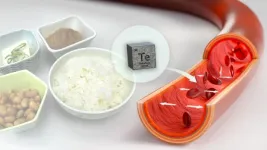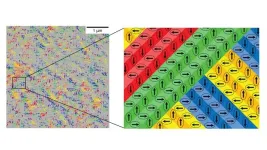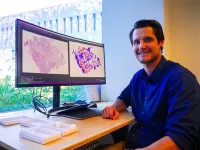In an innovative new study of glioblastoma, scientists used artificial intelligence (AI) to reprogram cancer cells, converting them into dendritic cells (DCs), which can identify cancer cells and direct other immune cells to kill them.
Glioblastoma is the most common brain cancer in adults and also the deadliest, with less than 10% of patients surviving five years after their diagnosis. While new approaches such as immunotherapy have revolutionized treatment for other cancers, they have done little for patients with glioblastoma. That is partly because these hard-to-reach brain tumors hide behind the blood-brain barrier, where immune cells struggle to reach and eliminate them.
But new research, supported in part by the National Institutes of Health and led by the Keck School of Medicine of USC, has leveraged AI to explore which genes control a cell’s fate—whether it develops into a heart cell, a lung cell or a cancer cell, for instance. The researchers identified genes that can reprogram glioblastoma cells, converting them into immune cells within the tumor itself so they effectively target their kin cancer cells for destruction.
In mouse models of glioblastoma, the approach increased the chances of survival by up to 75%. The results were just published in Cancer Immunology Research, a journal of the American Association for Cancer Research.
“This groundbreaking study leverages the power of AI to transform glioblastoma cells into immune-activating cells, marking a significant advancement in cancer immunotherapy,” said the study’s lead author David Tran, MD, PhD, an associate professor of neurological surgery and neurology and division chief of neuro-oncology at the Keck School of Medicine. “By turning the cancer's own cells against it, we are paving the way for more effective treatments and offering new hope to patients battling this and many other aggressive cancers.”
In addition to their work in animal models, researchers used AI to identify a set of genes that can convert human glioblastoma cells into immune cells. In the future, scientists could deliver that genetic material to glioblastoma patients by embedding it within an innocuous virus, a tool known as a viral vector.
“Forcing a cell with 20,000 genes to become something else is incredibly complex. Using traditional molecular approaches, it would be almost impossible to do,” said Tran, who also co-directs the USC Brain Tumor Center at USC Norris Comprehensive Cancer Center. “AI is helping us answer some critical questions and gives us a powerful way to learn how to manipulate a cell’s fate.”
Controlling the fate of a cell
DCs play a central role in activating the immune response: They sample antigens (such as from a cancer cell) and present them to other immune cells, including armies of T-cells, effectively triggering a full-scale attack.
Evidence suggests that DCs can fight glioblastoma, but scientists have not yet found a reliable way to get them past the blood-brain barrier and into the hostile environment of a tumor. By reprogramming cancer cells already located within the tumor, Tran and his team have bypassed this major challenge.
When manipulating the fate of a cell, one important consideration is specificity. Converting healthy brain cells into DCs, for example, could shrink a brain tumor but cause health problems.
“We don’t want to give something to a patient that can convert all sorts of cells into DCs,” Tran said.
The machine learning system he and his team developed was able to query tens of thousands of genes and millions of gene-to-gene connections and identify those that can specifically target glioblastoma cells and reprogram them to resemble DCs. This AI-driven method differs from previous research, which used what is known as an empirical approach to manually identify genes that control a cell’s fate.
‘The high computational power of AI is really helping us accelerate the discovery process,” Tran said.
Used alongside other immunotherapies, reprogramming glioblastoma cells significantly enhanced the immune response and survival rates in mouse models of glioblastoma. When combined with immune checkpoint therapy, the new approach improved the chance of survival by 75%. When combined with a classic DC vaccine, the new approach doubled the chance of survival. (Used alone, neither immune checkpoint therapy nor a DC vaccine increased the chance of survival in patients with glioblastoma.)
Moving toward clinical trials
In addition to the proof-of-concept study in mice, the researchers used their AI system to identify a set of human genes that can convert human glioblastoma cells into cells resembling DCs. Next, they plan to fine-tune that list, package the genetic material into a viral vector and begin an initial round of safety and efficacy tests in animal models.
“We want to expand the search, using AI to help us find the best possible combinations as we move toward testing in patients,” Tran said.
If the approach is deemed safe and effective—meaning it improves outcomes for glioblastoma models and does not cause unexpected side effects—Tran and his team will apply for approval to begin clinical trials in patients in several years. Down the line, they also hope to use their AI model to find genes that can reprogram other types of cancer cells to behave like DCs.
About this research
In addition to Tran, the study’s other authors are Tianyi Liu, Son B. Le and Dongjiang Chen from the Division of Neuro-Oncology, Departments of Neurological Surgery and Neurology and the USC Brain Tumor Center, Keck School of Medicine of USC, University of Southern California; and Dan Jin, Mathew Sebastian, Alberto Riva and Ruixuan Liu from the University of Florida College of Medicine, Gainesville, Florida.
This work was supported by the National Cancer Institute of the National Institutes of Health [R42CA228875, R01CA238387, P30CA014089 and F30CA232641] and the Bankhead Coley Research Program of the Florida Department of Health [6BC04].
Disclosure: Tran and Le are inventors of two patent applications [62/952,725 and 62/586,655] based on the data in this manuscript.
END




